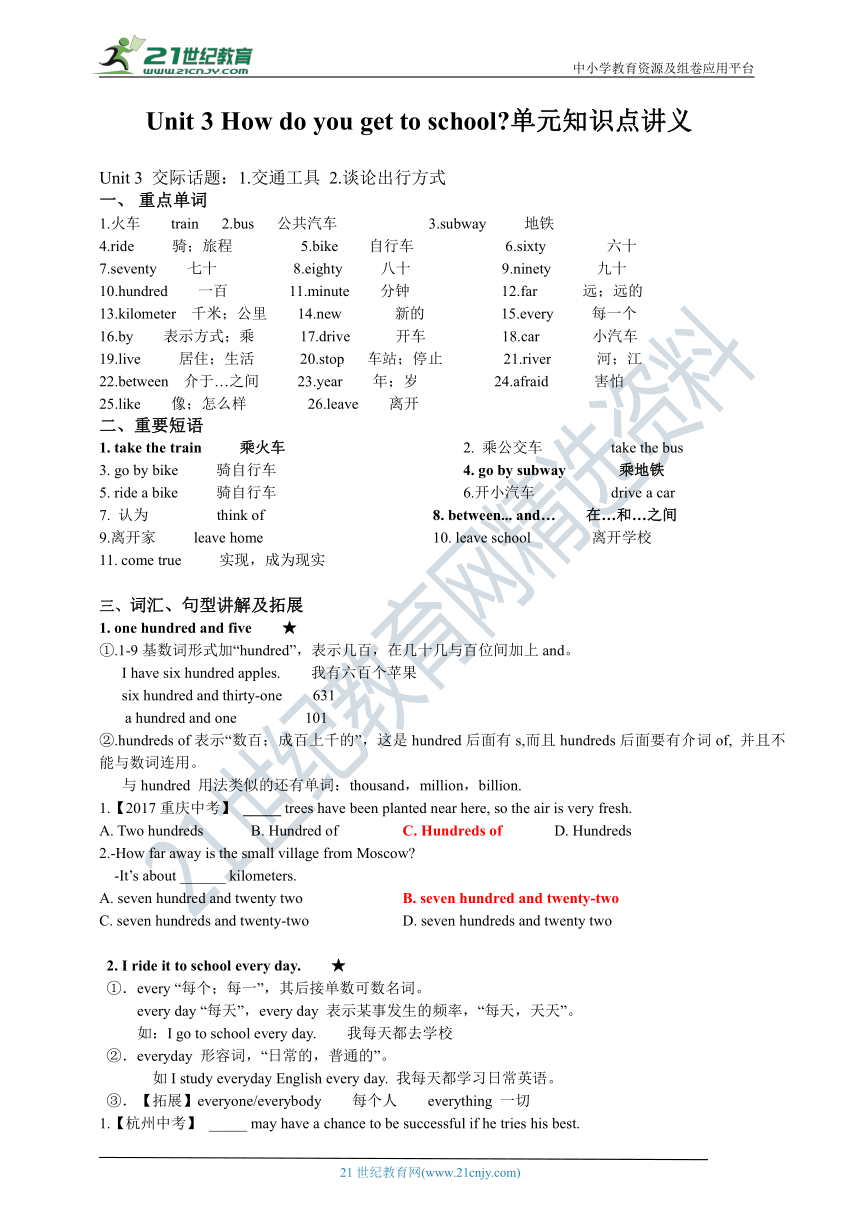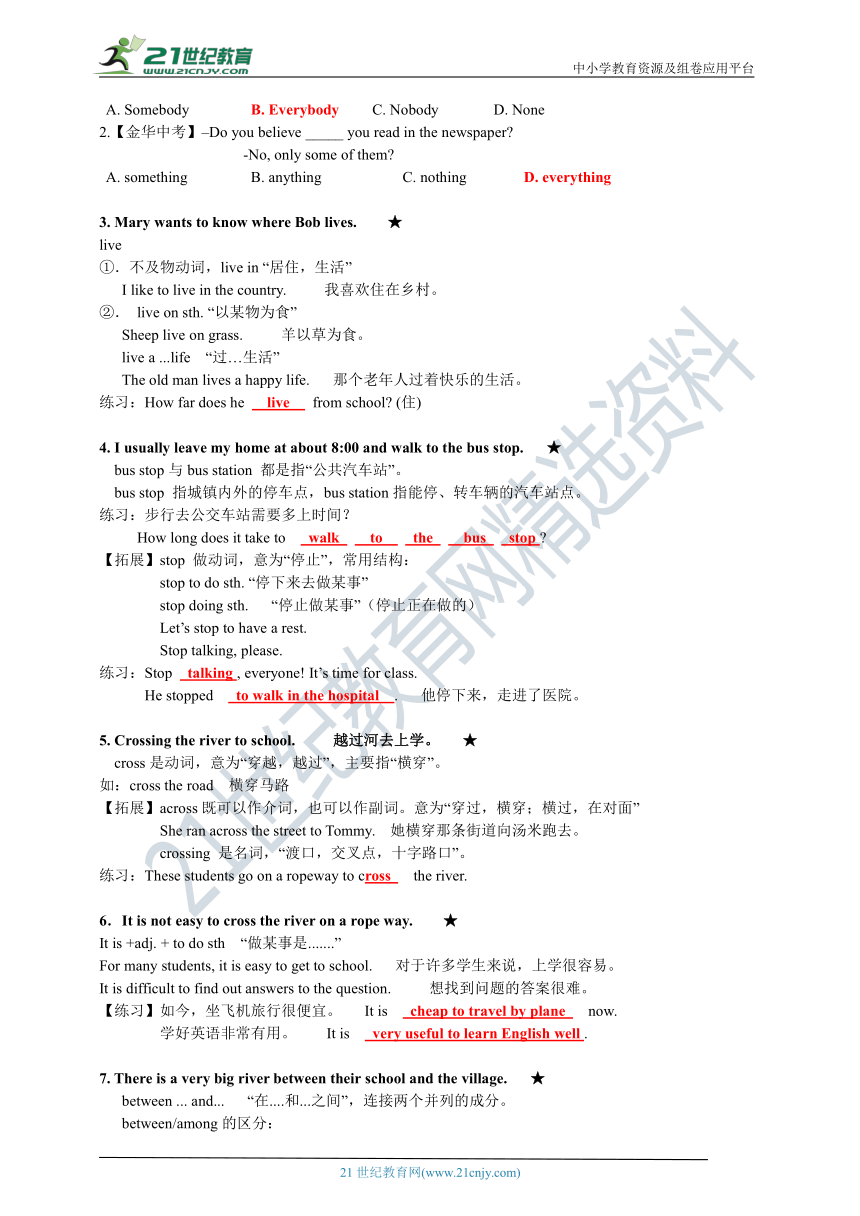Unit 3 How do you get to school?单元知识点讲义
文档属性
| 名称 | Unit 3 How do you get to school?单元知识点讲义 |  | |
| 格式 | zip | ||
| 文件大小 | 1.1MB | ||
| 资源类型 | 试卷 | ||
| 版本资源 | 人教新目标(Go for it)版 | ||
| 科目 | 英语 | ||
| 更新时间 | 2020-02-05 14:19:30 | ||
图片预览


文档简介
中小学教育资源及组卷应用平台
Unit 3 How do you get to school?单元知识点讲义
Unit 3 交际话题:1.交通工具 2.谈论出行方式
重点单词
1.火车 train 2.bus 公共汽车 3.subway 地铁
4.ride 骑;旅程 5.bike 自行车 6.sixty 六十
7.seventy 七十 8.eighty 八十 9.ninety 九十
10.hundred 一百 11.minute 分钟 12.far 远;远的
13.kilometer 千米;公里 14.new 新的 15.every 每一个
16.by 表示方式;乘 17.drive 开车 18.car 小汽车
19.live 居住;生活 20.stop 车站;停止 21.river 河;江
22.between 介于…之间 23.year 年;岁 24.afraid 害怕
25.like 像;怎么样 26.leave 离开
二、重要短语
1. take the train 乘火车 2. 乘公交车 take the bus
3. go by bike 骑自行车 4. go by subway 乘地铁
5. ride a bike 骑自行车 6.开小汽车 drive a car
7. 认为 think of 8. between... and… 在…和…之间
9.离开家 leave home 10. leave school 离开学校
11. come true 实现,成为现实
三、词汇、句型讲解及拓展
1. one hundred and five ★
①.1-9基数词形式加“hundred”,表示几百,在几十几与百位间加上and。
I have six hundred apples. 我有六百个苹果
six hundred and thirty-one 631
a hundred and one 101
②.hundreds of表示“数百;成百上千的”,这是hundred后面有s,而且hundreds后面要有介词of, 并且不能与数词连用。
与hundred 用法类似的还有单词:thousand,million,billion.
1.【2017重庆中考】 _____ trees have been planted near here, so the air is very fresh.
A. Two hundreds B. Hundred of C. Hundreds of D. Hundreds
2.-How far away is the small village from Moscow?
-It’s about ______ kilometers.
A. seven hundred and twenty two B. seven hundred and twenty-two
C. seven hundreds and twenty-two D. seven hundreds and twenty two
2. I ride it to school every day. ★
①.every “每个;每一”,其后接单数可数名词。
every day “每天”,every day 表示某事发生的频率,“每天,天天”。
如:I go to school every day. 我每天都去学校
②.everyday 形容词,“日常的,普通的”。
如I study everyday English every day. 我每天都学习日常英语。
③.【拓展】everyone/everybody 每个人 everything 一切
1.【杭州中考】 _____ may have a chance to be successful if he tries his best.
A. Somebody B. Everybody C. Nobody D. None
2.【金华中考】–Do you believe _____ you read in the newspaper?
-No, only some of them?
A. something B. anything C. nothing D. everything
3. Mary wants to know where Bob lives. ★
live
①.不及物动词,live in “居住,生活”
I like to live in the country. 我喜欢住在乡村。
②. live on sth. “以某物为食”
Sheep live on grass. 羊以草为食。
live a ...life “过…生活”
The old man lives a happy life. 那个老年人过着快乐的生活。
练习:How far does he live from school? (住)
4. I usually leave my home at about 8:00 and walk to the bus stop. ★
bus stop与bus station 都是指“公共汽车站”。
bus stop 指城镇内外的停车点,bus station指能停、转车辆的汽车站点。
练习:步行去公交车站需要多上时间?
How long does it take to walk to the bus stop ?
【拓展】stop 做动词,意为“停止”,常用结构:
stop to do sth. “停下来去做某事”
stop doing sth. “停止做某事”(停止正在做的)
Let’s stop to have a rest.
Stop talking, please.
练习:Stop talking , everyone! It’s time for class.
He stopped to walk in the hospital . 他停下来,走进了医院。
5. Crossing the river to school. 越过河去上学。 ★
cross是动词,意为“穿越,越过”,主要指“横穿”。
如:cross the road 横穿马路
【拓展】across既可以作介词,也可以作副词。意为“穿过,横穿;横过,在对面”
She ran across the street to Tommy. 她横穿那条街道向汤米跑去。
crossing 是名词,“渡口,交叉点,十字路口”。
练习:These students go on a ropeway to cross the river.
6.It is not easy to cross the river on a rope way. ★
It is +adj. + to do sth “做某事是.......”
For many students, it is easy to get to school. 对于许多学生来说,上学很容易。
It is difficult to find out answers to the question. 想找到问题的答案很难。
【练习】如今,坐飞机旅行很便宜。 It is cheap to travel by plane now.
学好英语非常有用。 It is very useful to learn English well .
7. There is a very big river between their school and the village. ★
between ... and... “在....和...之间”,连接两个并列的成分。
between/among的区分:
(1) between 用于两者之间。
(2) among 用于三个或三个以上的人或物的“中间”。
【练习】1.The store is _____ the post office _____ the library.
A. near; to B. across; from C. next; to D. between; and
2. There is a river between their school and the village.(在…之间)
8. But he is not afraid. ★
afraid “害怕的,畏惧的”。常与be afraid of 连用。
(1) be afraid of sth. 害怕某事/某物
如:He is afraid of the new teacher. 他很害怕那位新老师。
(2) be afraid of doing sth. 唯恐做某事,指担心或担忧做某事会引起某种后果。
如:I’m afraid of watching scary movies alone. 我很害怕独自看恐怖电影。
(3)be afraid + that 恐怕....
【练习】1.我很害怕蛇。 I’m afraid of snakes .
2.我恐怕帮不了你什么。 I’m afraid that I can’t help you .
9. Many of the students and villagers never leave the village. ★★
leave主要用法归纳如下:
①.离开; 脱离
如:The train will leave at six tomorrow morning. 火车明天早上六点离开。
②. 把……留在; 留下
如:Leave the child at home. 把小孩留在家里。
③. 遗忘; 丢下
如:I left my notebook in the dormitory. 我把笔记本落在宿舍里了。
④.使……处于(某种状态),后面常接宾语补足语。
Leave the door open.
⑤.leave for+地点,“动身去某地”
He left for the station a few minutes ago.
练习:- Can I borrow your watch?
- Sorry, I _____ it at home.
A. took B. forgot C. left D. bring
四、语法专项
how 引导的特殊疑问句
①.how 引导的特殊疑问句提问交通方式,其答语分三种情况:
a. take a/an/the+交通工具(单数)
take +a/an/the+表示交通工具的名词,乘……去某地。
如:He takes the train to Beijing. 他坐火车去北京。
I take a bus to school. 我搭公交车去上学。
b. by+交通工具(单数)
如:by plane 坐飞机 by bike 骑自行车
by+表示交通工具的单数名词或on/in+ a/an/the/one’s+表示交通工具的单数名词,是介词短语作方式状语。
I get to school by bike. = I get to school on my bike
c. on/in+限定词+交通工具.
如: on a bus 坐公交车去…
②.walk/ride/drive/fly + to + 地点名词,步行/骑自行车/开车/坐飞机去某地
表示乘交通工具方式可以互换表达相同的意义:
Take the bus to school=go to school by bus=go to school on a bus
Drive a car to work=go to work by car=go to work in a car
Fly to Shanghai=go to Shanghai by plane/air=take the/a plane to Shanghai=go to Shanghai on a/an/the plane.
【拓展】
③.how far 用来提问距离,“多远”,其答语分为两种:
(1)用长度单位表示:It is five kilometers.
(2)用时间表示:It’s twenty minutes’ walk.
④.how long 用来提问时间,意为多久。回答常用“for+时间段”或者“since+时间点”。
如:-How long have you learnt English?
-For 3 years./ Since 2017.
⑤.how soon 用来提问做完某事还需要多长时间,常用于将来时态时,常用“in+时间段”回答。
如:-How soon will you arrive in Beijing?
-In 3 hours.
1.【重庆中考】 - _____ will the supper be ready? I’m very hungry.
-In a minute.
A. How soon B. How long C. How much D. How often
2. - ______ does it take you to get home from your office?
-Twenty minutes.
A. How B. How far C. How long D. How much
3. He rides his bike to the bus station. (对划线部分提问)
How does he go to the bus station?
4. It takes twenty-five minutes to walk to the office.(对划线部分提问)
How long does it take to walk to the office?
21世纪教育网 www.21cnjy.com 精品试卷·第 2 页 (共 2 页)
HYPERLINK "http://21世纪教育网(www.21cnjy.com)
" 21世纪教育网(www.21cnjy.com)
同课章节目录
- Unit 1 Can you play the guitar?
- Section A
- Section B
- Unit 2 What time do you go to school?
- Section A
- Section B
- Unit 3 How do you get to school?
- Section A
- Section B
- Unit 4 Don't eat in class.
- Section A
- Section B
- Unit 5 Why do you like pandas?
- Section A
- Section B
- Unit 6 I'm watching TV.
- Section A
- Section B
- Review of Units 1-6
- Unit 7 It's raining!
- Section A
- Section B
- Unit 8 Is there a post office near here?
- Section A
- Section B
- Unit 9 What does he look like?
- Section A
- Section B
- Unit 10 I'd like some noodles.
- Section A
- Section B
- Unit 11 How was your school trip?
- Section A
- Section B
- Unit 12 What did you do last weekend?
- Section A
- Section B
